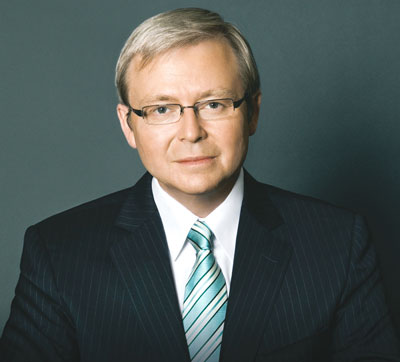Chiang Mai (Mizzima) – Continuing a run of high-profile foreign dignitaries to visit Burma, Australian Foreign Minister Kevin Rudd is due to arrive in the Southeast Asian country on Thursday.

Rudd will be in Burma from June 30 to July 2 and intends to meet with government and opposition leaders, including Aung San Suu Kyi.
The Australian’s visit comes close on the heels of a visit by a European Union delegation and also follows bilateral visits from United States, Chinese and Indian representatives. Subsequent to the convening of Parliament in Burma earlier this year, foreign governments have been keen to explore any changes in the Burmese political landscape.
‘This visit comes at a critical juncture in Burma's history and will allow the Australian government to assess how it can best support reform and economic development’, according to a statement on Friday from the Foreign Minister’s office.
Rudd said in the statement, ‘I will use these meetings to reiterate Australia's long-standing calls for genuine progress towards national reconciliation and democratic reform’.
In the run-up to Burma’s November 2010 general election, the Foreign Minister told the Australian Broadcasting Corporation, ‘What we in Australia intend to do is to watch what happens with the outcome of these elections, listen carefully to what Burmese democratic leaders have to say after the elections and then, of course, we'll be working through a range of further international options in dealing with the continued repression, as it's been up until now, of democracy by the Burmese junta’.
By 2012-2013, Australian overseas development assistance to Burma is expected to eclipse US$ 50 million. In 2009-2010, the corresponding figure stood at slightly more than US$ 29 million.
The visit will be the first by an Australian Foreign Minister since 2002, a year prior to the Depayin massacre that led to the imprisonment of opposition leader Aung San Suu Kyi, who was released on November 13 of last year.
Prior to paying his respects to Burma, Rudd will be in Equatorial Guinea for the opening session of the African Union Executive Council Meeting. According to Washington D.C.-based Freedom House, citizens of Equatorial Guinea enjoy the same level of civil and political rights as do the Burmese.


